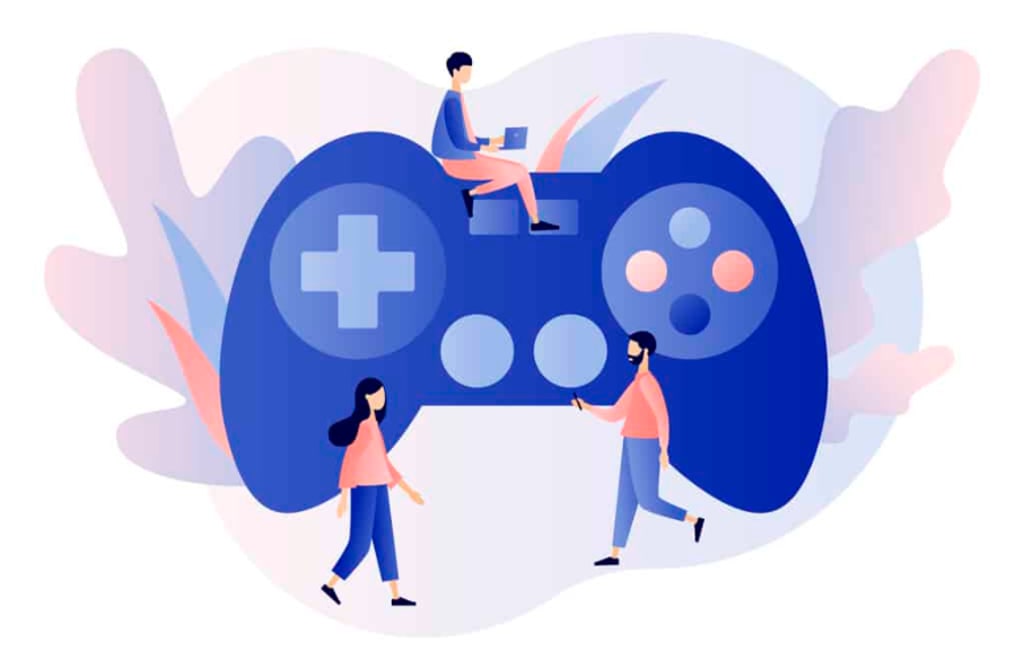Gaming Beyond Entertainment: Serious Games with Real-World Impact
Empowering Change: Gaming Beyond Entertainment with Serious Games for Real-World Impact

In recent years, the world of gaming has transcended its traditional role of providing mere entertainment and escapism. A new category of games has emerged, known as "Serious Games," which are designed with a profound purpose - to create real-world impact and address critical societal challenges. These games go beyond the boundaries of fun and excitement, offering immersive experiences that educate, promote health and wellness, tackle social issues, and even provide valuable training simulations.
Definition of Serious Games
To understand the concept fully, we'll delve into the definition of Serious Games and what sets them apart from traditional entertainment-focused games. Serious Games are interactive digital experiences explicitly designed to achieve educational, informational, or problem-solving objectives. They utilize gamification principles and mechanics to engage players while delivering valuable knowledge and experiences.
The Evolution of Gaming - From Entertainment to Real-World Impact
Gaming has come a long way since its inception, evolving from simple pixelated graphics to photorealistic virtual worlds. We'll explore the transformative journey of video games, highlighting the pivotal moments that shaped Serious Games into the impactful medium they are today.
Importance of Serious Games in Today's Society
As the world faces complex challenges related to education, healthcare, environment, and more, Serious Games have emerged as a powerful tool to tackle these issues. Their ability to engage, educate, and motivate players has caught the attention of educators, healthcare professionals, and organizations seeking innovative solutions.
Overview of the Blog Post
This blog post aims to shed light on the world of Serious Games and their real-world impact. We will examine different categories of Serious Games, such as educational, health-focused, socially impactful, and training simulations. Additionally, we will discuss the challenges faced in developing and implementing Serious Games while looking into their promising future.
Stay tuned for the upcoming sections, where we will explore captivating examples of successful Serious Games, the significant impact they have had in various fields, and the key factors that contribute to their effectiveness. Let's embark on a journey into the realm of Serious Games, where gaming goes beyond entertainment and makes a tangible difference in our world.
Understanding Serious Games
What are Serious Games? - Exploring the Concept
Serious Games, also known as applied games or gamified simulations, are digital games intentionally designed to serve purposes beyond entertainment. These games leverage the engaging and interactive nature of gaming to deliver specific learning objectives, address real-world issues, and foster behavioral change. While the core mechanics of Serious Games retain elements of traditional video games, their primary focus lies in delivering educational content, training simulations, or raising awareness about critical societal challenges.
Serious Games can take various forms, including interactive simulations, virtual reality experiences, mobile apps, and computer-based games. They may target different age groups and cover a wide range of topics, such as history, science, healthcare, social skills, emergency preparedness, and more. The effectiveness of Serious Games lies in their ability to immerse players in a virtual environment where they can actively participate and learn through trial and error, without real-world consequences.
Different Categories of Serious Games
1. Educational Serious Games
Educational Serious Games aim to enhance learning experiences by incorporating educational content and curricula into gameplay. These games are employed in schools and educational institutions to make learning more engaging and enjoyable for students. Whether teaching mathematical concepts, foreign languages, or historical events, educational Serious Games can supplement traditional teaching methods and cater to various learning styles.
2. Health and Wellness Serious Games
Health-focused Serious Games are designed to promote physical and mental well-being. They can be used in healthcare settings, fitness centers, or at home to encourage healthy behaviors, manage chronic conditions, and assist in physical rehabilitation. From interactive workouts to mental health exercises, these games provide personalized and interactive experiences to support individual health goals.
3. Social Impact Serious Games
Social Impact Serious Games tackle pressing societal issues, such as poverty, climate change, gender equality, and humanitarian crises. By raising awareness and fostering empathy, these games aim to inspire players to take action in real life and contribute to positive social change. They are powerful tools for advocacy and education on various global challenges.
4. Training and Simulation Serious Games
Training and Simulation Serious Games are used in professional settings to train individuals for specific tasks and scenarios. These games are commonly employed in military training, medical simulations, emergency response training, and other high-risk professions. By providing a safe environment for practice and skill development, these games help learners acquire practical expertise and enhance decision-making abilities.
Examples of Successful Serious Games with Real-World Impact
1. "Foldit" - An online puzzle game that allows players to contribute to scientific research on protein folding. Players' solutions have led to significant advancements in understanding protein structures, with implications for disease research and drug development.
2. "Re-Mission" - Designed for young cancer patients, this game empowers players to explore the human body and fight cancer cells, enhancing their understanding of cancer treatment and adherence to prescribed therapies.
3. "Pandemic" - A board game turned digital, "Pandemic" challenges players to collaborate as a team of specialists to combat infectious diseases. It has been used to improve teamwork and decision-making among healthcare professionals.
4. "iCivics" - Founded by former U.S. Supreme Court Justice Sandra Day O'Connor, iCivics offers a suite of educational games that aim to engage students in civics education and foster active citizenship.
In the next section, we will delve deeper into the real-world impact of Serious Games, exploring how they contribute to enhancing learning and education, promoting health and wellness, addressing societal challenges, and providing effective training and simulations.
👉Protect your digital world - Get NordVPN!👈
The Real-World Impact of Serious Games
Serious Games have proven to be more than just a form of entertainment; they have made a significant impact on various aspects of society, ranging from education and healthcare to environmental awareness and professional training. Let's explore the real-world impact of Serious Games in different domains:
Enhancing Learning and Education
1. Engaging Learning Experiences: Educational Serious Games have revolutionized the way students interact with educational content. By incorporating game mechanics like rewards, challenges, and progression systems, these games motivate students to actively participate in their learning journey.
2. Personalized Learning: Serious Games can adapt to individual learning styles, providing personalized learning experiences for each student. This level of customization helps students grasp difficult concepts at their own pace and fosters a deeper understanding of the subject matter.
Promoting Health and Wellness
1. Encouraging Healthy Behaviors: Health-focused Serious Games encourage players to adopt healthy habits and lifestyles. Whether it's through virtual fitness challenges or nutrition-based games, players can develop healthy behaviors and sustain them in their daily lives.
2. Supporting Medical Treatment: Serious Games play a crucial role in healthcare, assisting patients in managing chronic conditions, adhering to treatment plans, and learning about their medical conditions in an interactive and engaging way.
Addressing Societal Challenges
1. Raising Awareness: Social Impact Serious Games create empathy and awareness around pressing societal issues. Players experience the challenges faced by different communities, which can lead to increased empathy and a better understanding of the need for positive change.
2. Advocacy and Education: These games serve as powerful tools for advocacy and education on topics like climate change, poverty, and human rights. They encourage players to take action in real life, either through volunteering, donations, or becoming active advocates for change.
Professional Training and Simulation
1. Enhancing Skills and Decision-Making: Serious Games are used in professional settings to enhance skills and decision-making abilities. From military simulations to medical training scenarios, these games offer safe environments for learners to practice and hone their skills.
2. Cost-Effective Training: Serious Games can significantly reduce the costs associated with real-life training scenarios. They eliminate the need for physical equipment and allow learners to repeat exercises as needed without risks or additional expenses.
The success stories of Serious Games are impressive and continue to grow. For instance:
- Muzzy Lane's "Government in Action": This game simulates the roles of public servants and policymakers, fostering a deeper understanding of the complexities of governance and civic responsibilities.
- "Plastic Oceans VR - End of the Beginning": An immersive virtual reality experience that educates players about the impact of plastic pollution on marine ecosystems, motivating them to take action in preserving our oceans.
- "America's Army": A military recruitment tool that doubles as a training simulator, allowing prospective soldiers to experience realistic combat scenarios before real-world deployment.
In conclusion, the real-world impact of Serious Games is evident across diverse fields, showcasing their potential as powerful tools for positive change. As technology advances and creativity flourishes, we can expect Serious Games to continue making a meaningful difference in our society, tackling complex challenges and creating a brighter future for all.
👉Take action now - Safeguard with NordVPN!👈
Developing Effective Serious Games
Creating effective Serious Games that deliver real-world impact requires careful planning, collaboration, and a deep understanding of the target audience and objectives. In this section, we'll explore the key considerations and best practices for developing Serious Games:
The Role of Game Developers and Designers
1. Clear Learning Objectives: Before embarking on the development process, define the specific learning objectives and desired outcomes of the Serious Game. Align the game mechanics and content to ensure they support these objectives effectively.
2. Balancing Entertainment and Education: While the primary focus is on education and impact, it's essential to strike a balance between the educational content and engaging gameplay. A fun and immersive experience will keep players motivated and invested in the learning process.
3. Incorporating Engaging Storytelling: A compelling narrative can enhance the overall experience and make the Serious Game more memorable. Use storytelling techniques to create a context that resonates with the players and drives their engagement.
Collaborations and Partnerships
1. Domain Experts and Educators: Collaborate with subject matter experts and educators who can provide valuable insights and ensure the accuracy and relevance of the educational content. Their expertise will enhance the learning experience and align the Serious Game with academic standards.
2. NGOs and Serious Game Initiatives: Partnering with non-governmental organizations (NGOs) and existing Serious Game initiatives can provide valuable resources, funding, and access to target audiences. Such collaborations can amplify the game's impact and reach.
User Feedback and Iterative Design
1. User Testing and Evaluation: Conduct thorough user testing to gather feedback from the target audience during different stages of development. Understand their preferences, challenges, and suggestions to refine the game and ensure it meets their needs.
2. Continuous Improvement and Updates: Serious Games should be treated as dynamic projects that evolve over time. Analyze user data, track learning outcomes, and regularly update the game to improve its effectiveness and relevance.
Accessibility and Inclusivity
1. Platform and Device Compatibility: Ensure that the Serious Game is accessible on various platforms and devices, including computers, tablets, and smartphones. This will broaden the game's reach and accommodate different user preferences.
2. Consideration for Diverse Audiences: Account for cultural and demographic diversity in your target audience when designing the game. Cultural sensitivity and inclusivity are essential to creating a positive user experience.
Data Privacy and Security
1. Data Protection: If the Serious Game collects user data, prioritize data privacy and security. Comply with relevant regulations and inform users about data collection and usage transparently.
2. Age-Appropriate Content: Tailor the game's content to be suitable for the intended age group and ensure compliance with privacy laws, especially concerning minors.
By following these best practices and incorporating the latest technologies and trends, developers and designers can create effective Serious Games that leave a lasting impact on players' lives. Remember that the journey of developing Serious Games doesn't end with launch - continuous improvement and engagement with the target audience are key to sustained success and achieving real-world impact.
👉Stay safe online - Join NordVPN!👈
Challenges and Future of Serious Games
Serious Games have demonstrated their potential for real-world impact, but they also face several challenges that need to be addressed. As we look towards the future, there are exciting opportunities for growth and innovation in this field. Let's explore the challenges and potential future advancements of Serious Games:
Challenges
1. Perceptions and Stigma: Despite their proven effectiveness, Serious Games may still face skepticism and resistance from some individuals who view games as mere entertainment. Overcoming this perception and highlighting the educational and impactful aspects of Serious Games is crucial.
2. Technical and Financial Constraints: Developing high-quality Serious Games often requires significant resources, including funding, skilled developers, and technology infrastructure. Smaller developers and organizations may find it challenging to meet these requirements.
3. Measuring Impact and Effectiveness: Quantifying the tangible impact of Serious Games can be complex. Developing reliable methods to assess learning outcomes, behavioral changes, and societal impact is essential for gaining broader support and funding.
4. Competing with Entertainment Games: Serious Games may struggle to gain visibility and traction in a gaming market dominated by entertainment-focused games. Effective marketing strategies and partnerships can help address this challenge.
Future Advancements
1. Advancements in Technology: With ongoing advancements in technology, including virtual reality, augmented reality, and artificial intelligence, Serious Games have the potential to offer even more immersive and personalized experiences.
2. Global Reach and Accessibility: As internet access expands and technology becomes more affordable, Serious Games can reach wider audiences across the globe, addressing educational and societal challenges on a global scale.
3. Cross-Disciplinary Collaboration: Collaborations between game developers, educators, healthcare professionals, scientists, and NGOs will lead to the creation of more impactful and multidisciplinary Serious Games.
4. Data-Driven Insights: Leveraging data analytics and user feedback will enable developers to continuously improve Serious Games, tailoring them to meet the specific needs and preferences of users.
5. Integration with Formal Education: As Serious Games gain credibility and recognition, they have the potential to be integrated into formal education systems as complementary tools to enhance learning experiences.
6. Addressing Emerging Societal Issues: Serious Games can be at the forefront of addressing emerging societal challenges, such as climate change, mental health, and digital literacy, by creating engaging and educational experiences.
7. Inclusivity and Diversity: Future Serious Games should aim to be inclusive and represent diverse perspectives to ensure that all users feel represented and engaged.
Serious Games have the potential to be transformative tools for education, training, and social impact. While challenges remain, ongoing technological advancements and increased recognition of their value present exciting opportunities for the future. By addressing the challenges and staying committed to creating impactful and innovative experiences, the Serious Games industry can continue to make a meaningful difference in the world. As the field evolves, it is essential to prioritize collaboration, research, and user-centric design to unlock the full potential of Serious Games in driving positive change in society.
👉Unlock security - Try NordVPN👈
Conclusion
In conclusion, Serious Games have emerged as a powerful medium that extends beyond traditional gaming, offering real-world impact and addressing critical societal challenges. These interactive digital experiences are intentionally designed to achieve educational, informational, or problem-solving objectives, leveraging gamification principles to engage players while delivering valuable knowledge and experiences.
Throughout this blog post, we have explored the various aspects of Serious Games, from understanding their concept and different categories to delving into their real-world impact. We have seen how Serious Games enhance learning and education by making it more engaging and personalized, promote health and wellness by encouraging healthy behaviors and supporting medical treatment, and tackle societal challenges by raising awareness and fostering empathy.
Developing effective Serious Games requires careful planning, collaboration with domain experts, and a user-centric approach. Balancing entertainment with education, incorporating engaging storytelling, and seeking continuous feedback are essential elements to create impactful games.
Though Serious Games face challenges such as perception, technical requirements, and measuring impact, their future is promising. Advancements in technology, global accessibility, cross-disciplinary collaborations, and data-driven insights offer exciting opportunities for growth and innovation.
As we look to the future, Serious Games have the potential to be integrated into formal education systems, address emerging societal issues, and represent diverse perspectives. By staying committed to overcoming challenges and harnessing the power of gaming for positive change, the Serious Games industry can make a lasting impact on education, healthcare, advocacy, and training.
In the ever-evolving landscape of gaming, let us embrace the potential of Serious Games as catalysts for learning, empathy, and transformation. As game developers, educators, and advocates, we have the responsibility to harness the power of gaming beyond entertainment and shape a better, more informed, and empathetic world through Serious Games. Together, we can embark on a journey of learning, growth, and change, as gaming transcends boundaries and leaves a lasting impact on individuals and society as a whole.
Related Articles
👉Console vs. PC Gaming: Which Reigns Supreme?
👉Exploring the Virtual Worlds: A Journey into MMO Gaming
👉The Future of Gaming: What to Expect in the Next Decade
Disclaimer: This article contains affiliate links. If you click on these links and make a purchase, we may earn a commission at no additional cost to you.
About the Creator
Lawrence Powell
Highly skilled and experienced Cybersecurity Engineer with a passion for protecting digital assets from ever-evolving cyber threats.






Comments
There are no comments for this story
Be the first to respond and start the conversation.